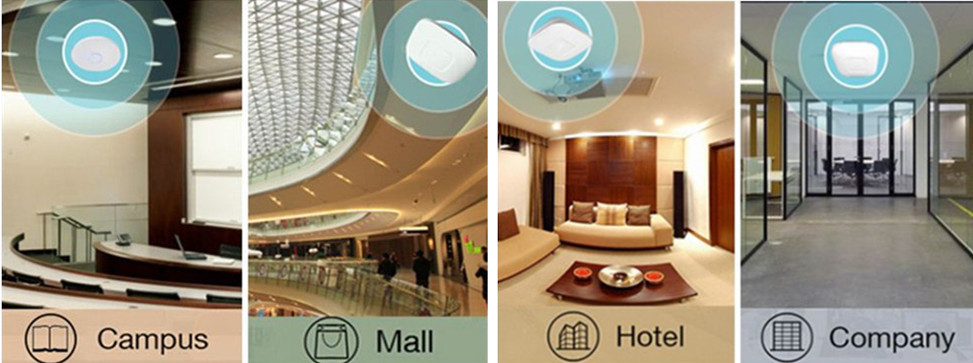Wi-Fi technology has improved greatly in recent years. It has great impact on our life style and work habits. As an important component in this technology, wireless access points (APs) has become more prevalent than before, for they can provide a convenient way to wired networks. But it’s not one-size-fits-all, especially when it comes to businesses. They may suits large office spaces with heavy traffic, but not small offices with limited users. Of course, all situations cannot be treated as the same. Let’s take a look at how to choose a suitable wireless access point for your business.
A wireless access point is a hardware device or configured node in a local area network (LAN) that connects to a wired router, switch, or hub via an Ethernet cable, and projects a Wi-Fi signal to a designated area. It can be used both in an office or a large building.

As we all know, business network is not like a home Wi-Fi network. The latter one only has a limited number of devices at one time, but the former need to handle numbers of connections simultaneously. Generally, wireless access points can handle over sixty connections each at the same time. When employees or guests connecting with desktops, laptops, tablets or mobile phones, they can get access to your wired network easily and quickly.
In a word, here are what the wireless access points can bring for your business:
- Improve productivity by allowing employees to access company resources from anywhere in the workspace
- Wireless access points compatible with PoE eliminate the need to run separate power line or install an outlet near the access point, which saves cost and installs time
- Wireless access points supporting Captive Portal and Access Control List (ACL) give you more convenience to manage your Wi-Fi networks
It’s not easy to select a suitable wireless access point for business networks if considering several factors. Well, it’s no doubt that the standards should be put in the first place. Therefore, I’ll talk more about other practical factors that may be ignored.

As technologies are evolving so fast, it’s important to choose wireless access points that firmware upgrades. It is also beneficial if the upgrades can be done from a central access point, which automatically allocates the upgrade to other access points on the network.
A wide range of wireless access points available for your business to choose from in the market. Depending on the area you’ll need to cover will be a main determining factor here. Will they be for indoor or outdoor use? Is there a need for considerable shielding for outdoor use? Before you adding the APs in your cart, these questions need to be answered at first.
Wireless access points have a good working performance in a normal environment like office or mall. But we cannot exclude some extreme temperatures occur, especially in outdoor use. So have a clear view of the working temperatures with wireless access points is the key to determine how long your APs can work for you.
Once you have known clearly which kind of wireless access points is suitable for your business networks, it’s time to compare the price. It’s obvious that price plays a vital role in the selection of wireless access points. According to your actual conditions to choose a suitable wireless access point. Be aware of the features that can simplify the process of installation.
Except for the considerations above, other factors such as speed and mounting style also need to be taken into account.
By installing access points through the workplaces, employees can roam freely from room to room without experiencing network interruptions. Their devices shift seamlessly from one access point to the next without dropping the connection through the workplaces, improving work efficiency greatly. Therefore, choosing the best wireless access points is important.
